- fr Change Region
- Global Site
- Accueil
- Nikon BioImaging Centers
- Baylor College of Medicine

Centre d’excellence
Baylor College of Medicine
The Baylor College of Medicine Nikon Center of Excellence housed in the Center for Precision Environmental Health (CPEH) provides state-of-the-art technology to support cutting edge research converging on epigenetics, cancer biology, birth defects and environmental factors that ultimately shape disease susceptibility and outcome. The Nikon platforms will be used to leverage imaging in a variety of model systems including cell culture models, zebrafish, C. elegans and mouse/human tissues and sections.
Contactez Nous
Directors
email hidden; JavaScript is required
email hidden; JavaScript is required
Address
Center for Precision Environmental HealthBaylor College of Medicine
One Baylor Plaza
Alkek Building N1317.04
Houston, TX 77030
Systems Available
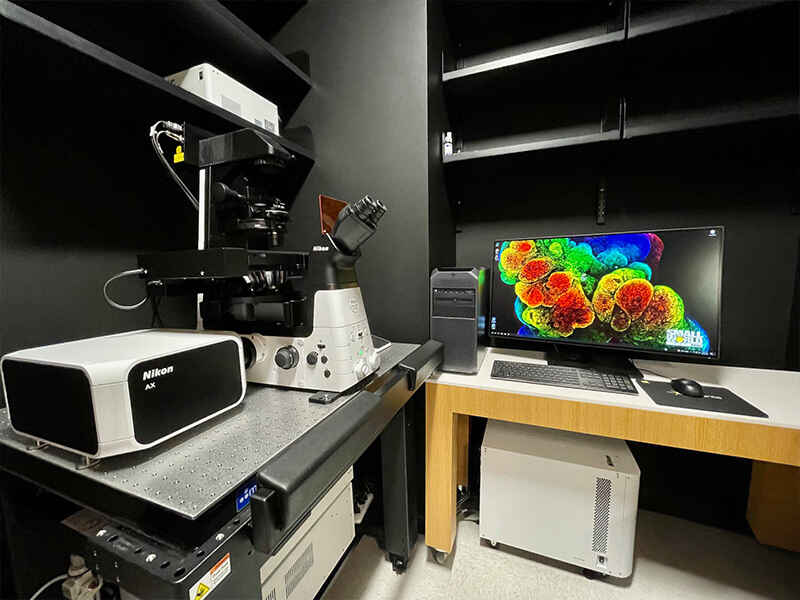
AX Confocal System
The AX R is a recently developed iteration of Nikon’s flagship confocal system, and is capable of 2k resonant scanning in an expanded 25 mm FOV for fast, gentle imaging of sensitive samples.
Components
- Microscope inversé Ti2-E proposant un système à mise au point parfaite 4 (PFS4)
- AxR resonant scanning confocal microscope system
- 405/488/561/640 nm Lasers
- DUX-VB 4CH variable detector and diascopic detector unit
D-LEDI LED Fluorescence for DAPI/GFP/DsRED/Cy5
- Plan Apo Lambda 2X, 10X, 20X, 40X, and 60X oil objectives with DIC
NIS-Elements High Content software with 2D/3D deconvolution and extended depth of focus
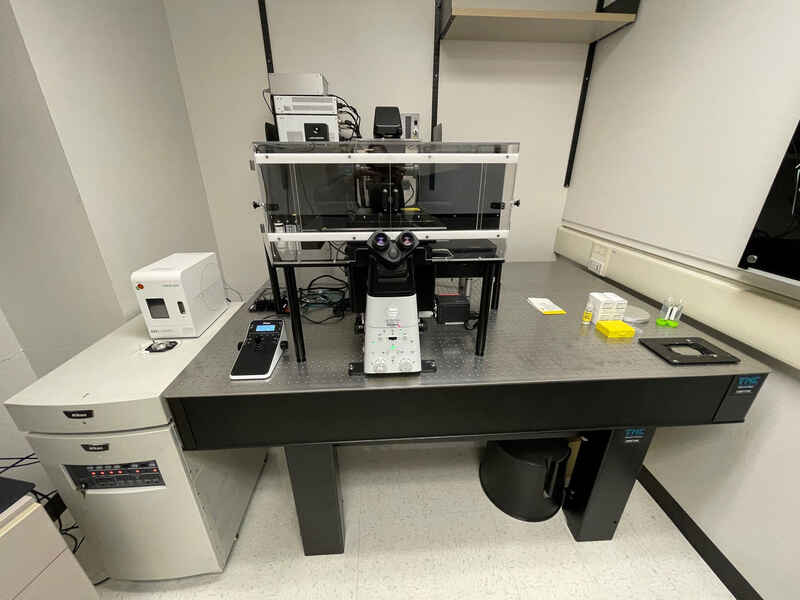
N-SIM S Super-Resolution System
Utilizing Structured Illumination Microscopy (SIM), this system exceeds the diffraction limit of traditional imaging systems, and is ideal for resolving structures ~100 nm in size. (XY resolution 100-115 nm, Z resolution 270 nm)
Components
- Microscope inversé Ti2-E proposant un système à mise au point parfaite 4 (PFS4)
- N-SIM S à super-résolution
- LUN-4 4-line laser unit (405nm, 488nm, 561nm, 640nm)
- Hamamatsu ORCA-Flash4.0 V2+ sCMOS camera
- Lumencor SOLA SE II LED Fluorescence for DAPI/GFP/TXRED
- NIS Elements Advanced Research with SIM Acquisition/Analysis, JOBS
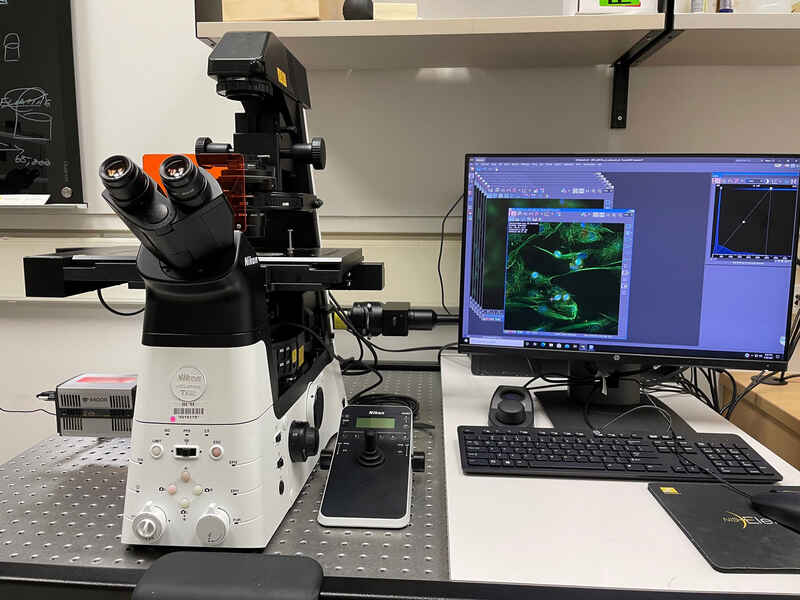
ECLIPSE Ti2 Inverted Microscope
This widefield system is capable of large sample imaging experiments, and uses Nikon’s flagship ECLIPSE Ti2 inverted microscope base. It is also equipped with NIS-Elements 2D/3D Deconvolution and Clarify.ai for enhanced image quality.
Components
- Microscope inversé Ti2-E proposant un système à mise au point parfaite 4 (PFS4)
- Andor Zyla 4.2+ sCMOS Monochrome Camera
- Lumencor Sola SE II LED Fluorescence for DAPI/GFP/TXRED/CY5
- Lambda 10x, 20x, 40x, 60x oil objectives
- Recherche avancée NIS-Elements avec déconvolution 2D/3D et Clarify.ai
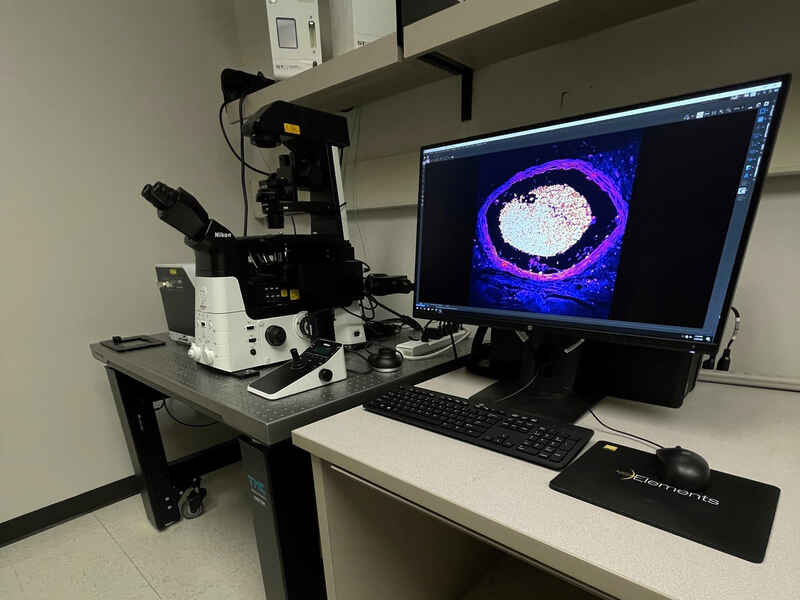
CSU-W1 Spinning Disk Confocal System
This system allows for fast, gentle image acquisition, and is ideal for brightfield slide scanning in live and fixed cells.
Components
- Microscope inversé Ti2-E proposant un système à mise au point parfaite 4 (PFS4)
- Yokogawa CSU-W1 spinning disk confocal
- 405/488/561/640nm Lasers (Emission Filters: 455/50, 525/36, 605/52, 705/72)
- Photometrics Prime95B sCMOS monochrome camera
- Excite 110LED Fluorescence for DAPI/GFP/TXRED
- Plan Apo Lambda 20x, Super Plan Fluor ELWD 20x, Plan Fluor 40x oil, 100x oil objectives
- DS-Fi3 5.9MP color camera
- Tokai Hit stage-top incubation system
- NIS-Elements Advanced Research with extended depth of focus
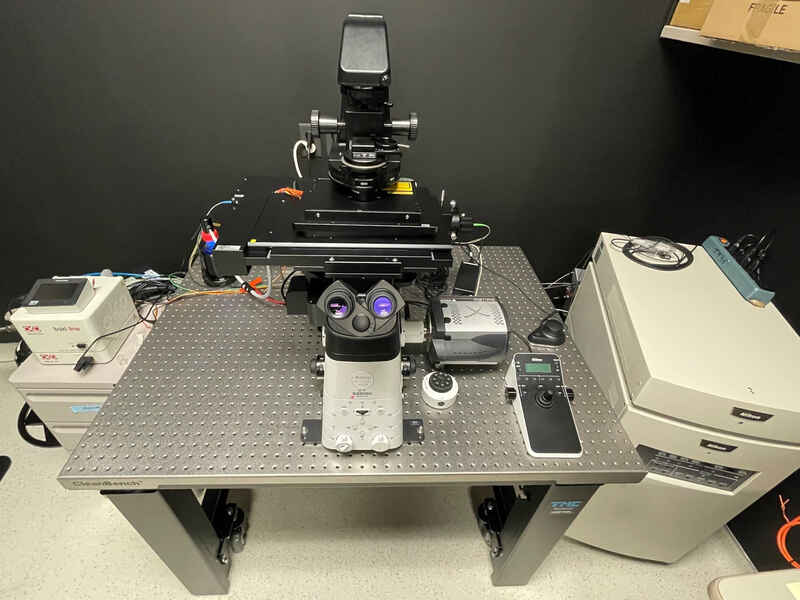
TIRF/FRAP Inverted Microscope
This inverted ECLIPSE Ti2 microscope is equipped for super-resolution imaging applications, including N-STORM, TIRF and FRAP imaging. It is best suited for single molecule imaging in live and fixed cells.
Components
- Microscope inversé Ti2-E proposant un système à mise au point parfaite 4 (PFS4)
- N-N-STORM illuminator with 405/488/561/647nm lasers
- FRAP module
- Andor iXON Ultra EMCCD monochrome camera
- Plan Apo Lambda 20x, 40x, 60x oil, HP Apo TIRF 100x objective
- Excite Xylis LED Fluorescence for DAPI/GFP/TXRED/CY5
- Okolab H301 stage-top incubator
- NIS-Elements Advanced Research with extended depth of focus, JOBS
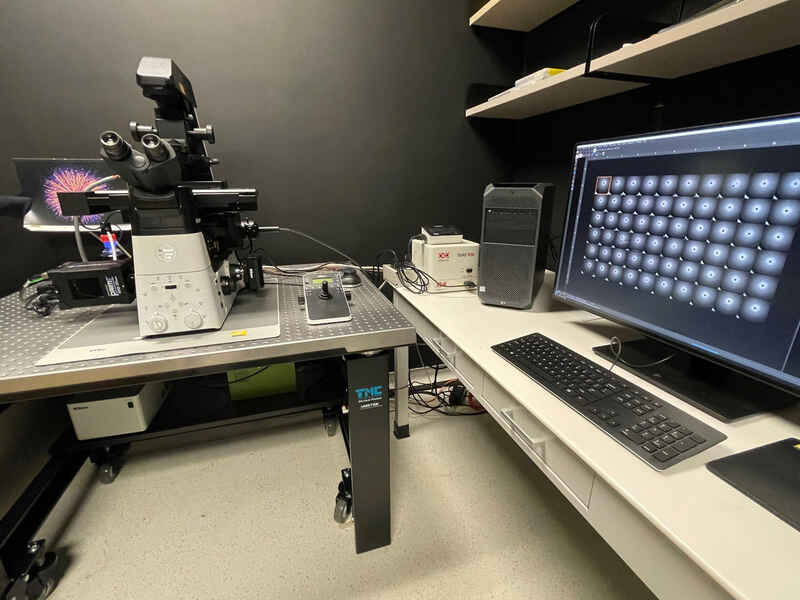
High Content Analysis System
System capable of fast, large field of view imaging in fluorescence, brightfield, plate and slide scanning experiments. Suitable for live and fixed cells.
Components
- Microscope inversé Ti2-E proposant un système à mise au point parfaite 4 (PFS4)
- Photometrics Prime95B sCMOS camera
- DS-Fi3 5.9MP color camera
- Excite Xylis LED Fluorescence for DAPI/GFP/TXRED/CY5
- Plan Apo Lambda 2x, Plan Fluor 4x, 10x, Super Plan Fluor ELWD 20x, 40x objectives
- Okolab H301 stage-top incubator
- NIS-Elements Advanced Research with HCA, GA3, extended depth of focus, 2D/3D measurement
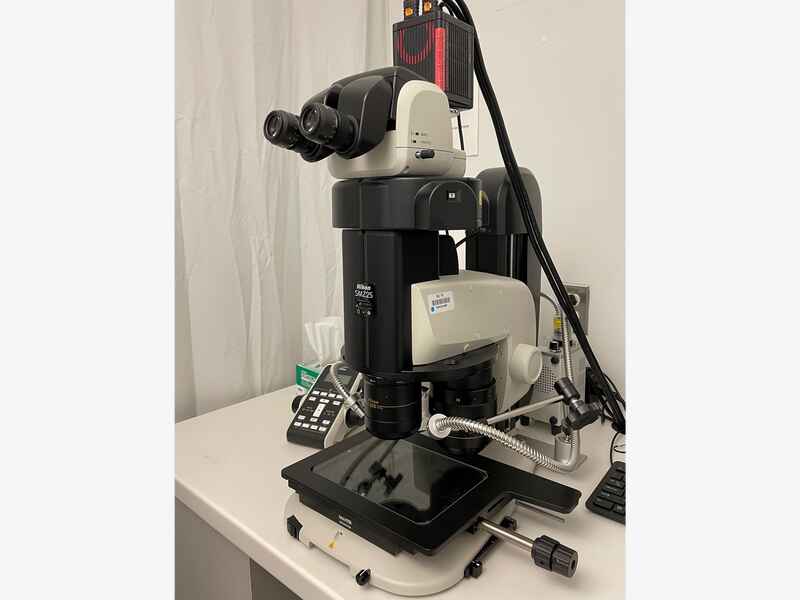
SMZ25 Stereo Microscope
Stereo microscope with 25X zoom range, suitable for fluorescence imaging, developmental studies, live and fixed cells.
Components
- SMZ25 motorized stereo microscope
- Hamamatsu Orca Flash 4 sCMOS monochrome camera
- 1x and 2x Plan Apo objectives
- Lumencor Sola SE II LED Fluorescence for CFP/YFP/GFP/TXRED
- Tokai Hit stage-top incubation system
- NIS-Elements Advanced Research
- Accueil
- Nikon BioImaging Centers
- Baylor College of Medicine
